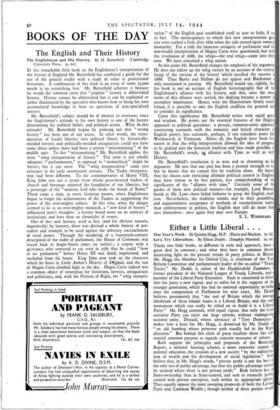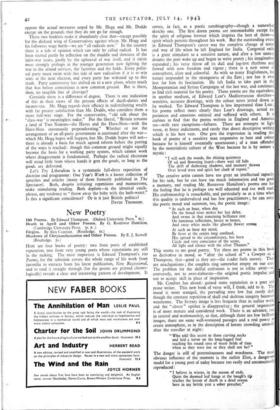Either a Little Liberal . . .
THESE two little books, so different in style ana approach, have a great deal in common ; and what they have in common throws interesting light on the present trends of party politics in Britain Mr. Hogg, the Member for Oxford City, is chairman of the Too Reform Committee and parliamentary leader of the so-called "Young Tories." Mr. Dodds is editor of the Huddersfield Examiner, a former president of the National League of Young Liberals, and member of the Liberal Party Executive. Each is concerned to infuse into his party a new vigour, and to enlist for it the support of the younger generation, which has had no national opportunity to influ- ence the composition of Parliament for nine years. Mr. Dodds believes passionately that "the sort of Britain which the average inhabitant of these islands wants is a Liberal Britain, and the only instrument which can really be relied on to build it is a Liberal Party." Mr. Hogg contends, with equal vigour. that only the Con- servative Party can carry out large reforms without endangering national unity. Disraeli, whose advocacy of "Tory Democracy makes him a hero for Mr. Hogg, is dismissed by M,r. Dodds at "an old humbug whose primrose path usually led in the Rigilt direction." But behind this clash of party loyalties there lies sub- stantial common purpose as regards concrete measures of reform.
Both support the principles and proposals of the Beveridge Report, a national housing scheme, a more extensive system of national education, the creation of a new society "by the redistribu- tion of wealth and the development of social legislation." Both believe that, in Mr. Hogg's words, "private profit is not the best of the only test of public advantage, but that the public advantage cannot be secured where there is not private profit." Both believe less I! State-ownership than in State-control, and seek to reconcile public control with private enterprise, each within its appropriate sphert- They equally oppose the more sweeping proposals of both the Labour., Party and Common Wealth ; though neither of these parties wouw
oppose the actual measures urged by Mr. Hogg and Mr. Dodds except on the grounds that they do not go far enough.
These two booklets make it abundantly clear that—except possibly for the diehard wing of Conservatives against whcm Mr. Hogg and his followers wage battle—we are "all radicals now." In the country there is a tide of opinion which can only be called radical. It has been started partly by reflection on the muddle and slowness of the infer-war years, partly by the upheaval of war itself, and it exists most strongly perhaps in the younger generation now fighting the war in the armed services, the factories and the fields. Every politi- cal party must swim with this tide of new radicalism if it is to win seats at the next election, and every party has wakened up to this truth. Party controversy has shifted on to a new plane, where much that 'vas before contentious is now common ground. But is there, then no tangible line of cleavage?
Certainly there is a difference of degree. There is one indication of this in their views of the present effects of death-duties and income-tax. Mr. Hogg regards their efficacy in redistributing wealth with far greater satisfaction than Mr. Dodds, who considers them a- mere half-way stage. For the conservative "old talk about the 'class-war' is meaningless today." For the liberal, "Britain remains a land of Two Nations—the Haves and the Have-Nots—with the Have-Nots enormously preponderating." Whether or not the arrangement of an all-party government is continued after the war—. which Mr. Hogg hopes will happen, but Mr. Dodds hopes will not= there is already a basis for much agreed reform before the parting of the ways is reached : though this common ground might equally become the basis for a working party system, which cannot work where disagreement is fundamental. Perhaps the radical electorate will mind little from whose hands it gets the goods, so long as the goods are delivered.
Let's Try Liberalism is a systematic full-dress exposition of doctrine and programme: One Year's Work is a looser collection of speeches and articles (many of them formerly published in The Spectator). Both, despite irritating repetitions and mannerisms, make stimulating reading. Both deplore—in the identical catch- phrase, any tendency to "throw away the baby with the bath-water." Is this a significant coincidence? Or is it just British politics?
DAVID THOMSON.



























 Previous page
Previous page